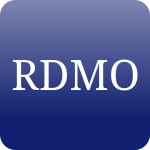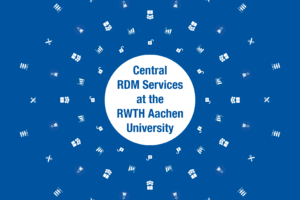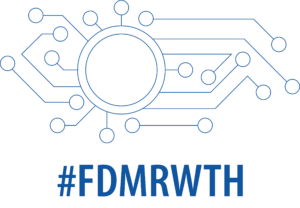This article is part of our series “Central RDM Services at RWTH Aachen University“. It is intended to show our researchers – i.e. you – which RDM services are offered at RWTH Aachen University to support you in your research and data management. We talk to the people responsible for the services and collect all the information for you in the individual articles. In this article, we would like to introduce you to the RDM service “Research Data Management Organizer (RDMO)”.
Important Facts

Source: RDMO
- Official Name of the Service: Research Data Management Organizer (RDMO)
- Link to the Homepage of the Service: rdmo.rwth-aachen.de/
- Target Group: Researchers who want to create a data management plan (DMP)
- Type: DMP tool
- Since 2018 at the RWTH Aachen University
Example of an RDMO Usage Scenario
A realistic example is that a researcher at RWTH Aachen University would like to apply for funding for a project, e.g. from the DFG. Research funders such as the DFG are increasingly demanding a data management plan (DMP), or a precise idea and description of how data will be handled during and after the project. A DMP is a completed catalog in RDMO that contains all questions on project and (research) data management.
RDMO is suitable for filling in all relevant questions on data management. The “DFG checklist (RWTH template)” is a catalog developed especially for RWTH. The questions it contains are based on the questions on research data management (RDM) from the DFG and offer answer options with all relevant services offered at RWTH.
It is advisable to use services hosted centrally at your own institution in order to have contact persons on site and to be better informed about data security. Using the RWTH template in RDMO has several advantages for researchers:
- They have already thought about their data at the start of the project.
- You know which tools and services are offered at the RWTH, some of which are free of charge for you.
- You have answered all the important questions for the DFG.
What Is Behind RDMO?
The RDM service is available free of charge to all members of the RWTH (and beyond). After logging in, you can create a project and choose from a selection of different question catalogs. Each catalog contains all relevant questions on RDM as well as further project- or topic-specific aspects. Within the project created in RDMO, the catalog can then be answered alone or in cooperation. The answers can then be exported in various formats and processed further if necessary.
The tool was created as an open source project and is constantly being further developed by the community. Local adaptations can be made after consultation with the University Library.
Who Exactly Is the Service Suitable For?
Who Is Authorized to Use RDMO?
RDMO is suitable for researchers who want to gain an overview of relevant RDM topics, transfer the information to their own project and record it in a structured manner.
RDMO offers data management officers or project coordinators the opportunity to specify internal project instructions and regulations and make them available to all project participants via the catalogs. At the same time, they can maintain an overview of all sub-projects, as RDMO offers the option of overarching project organization via role management or the hierarchical arrangement of projects.
RDMO can be used free of charge by all members of the RWTH. Members of other institutes and organizations can also be invited to log in to RDMO via the partner coupon procedure.
Where Is the Data Stored, How Is It Backed Up and How Long Can the Service Be Used?
The RWTH University Library offers an RDMO instance on its own server. Entered data is stored on this server and can only be viewed and exported by the invited members of a project and the admins at RWTH Aachen University Library (UB).
Context to the Bigger Picture: What Purpose Does RDMO Fulfill in Modern Scientific Practice?
What Function does RDMO Have in Modern Knowledge Management?
RDMO was developed to facilitate the description of project-internal regulations on RDM and to create a nationally standardized service that can be used by all universities, institutes and organizations.
The community-supported further development ensures that even smaller organizations with few staff have the opportunity to offer an up-to-date service.
Further Information
If you have any questions, please contact our servicedesk with the subject “RDMO”: We will be happy to help you.
The information was kindly provided to us by the RDMO service manager, Sabine Schönau.






Leave a Reply
You must be logged in to post a comment.